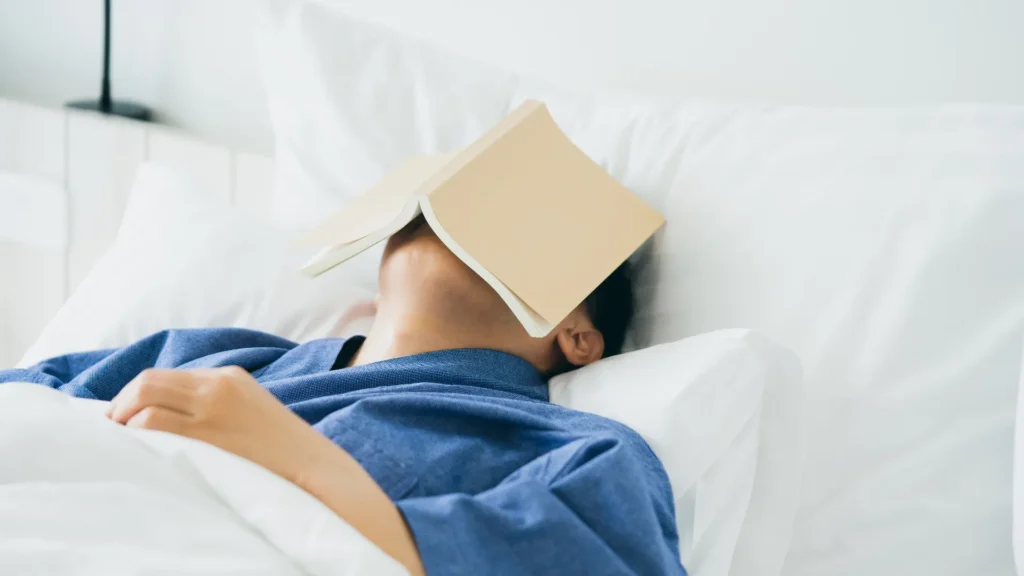Introduction
A rejuvenating night’s sleep is not just a luxury; it’s a cornerstone of a healthy lifestyle. The importance of sleep extends far beyond simply feeling rested. It plays a pivotal role in our physical and mental well-being, influencing everything from cognitive function to metabolic processes.
Yet, in today’s fast-paced world, getting good sleep has become increasingly elusive for many. With the glow of screens delaying bedtime and the weight of daily stresses tossing us into restlessness, the quality of slumber often slips through our fingers.
In this article, we will embark on a journey to understand why sleep should sit high on your list of health priorities. You’ll discover how sleep intricately intertwines with brain functions, dictating our ability to learn, remember, and regulate emotions. We’ll also navigate through practical steps to optimize your sleeping environment and routine for the best rest possible.
Additionally, we’ll delve into lifestyle habits that foster healthy sleep hygiene and tackle common challenges that disrupt our nightly repose. Equipped with actionable advice, you can transform your nights, reaping all the benefits that come with deep, restorative sleep.
The Link Between Sleep and Our Brain Functions

Sleep and Learning
The brain’s ability to absorb new information is significantly influenced by sleep. Studies show that during sleep, particularly the deep REM (Rapid Eye Movement) phase, the brain consolidates learning and memory. This process involves transferring knowledge from short-term to long-term memory, a critical step for learning new skills or assimilating new information.
Sleep and Memory Consolidation
Memory consolidation is not just about storing information; it’s also about optimizing the brain’s ability to recall. Quality sleep acts like a fine-tuner for our memories, ensuring that what we’ve learned during the day is securely stored and easily accessible when needed.
Sleep and Performance
Adequate sleep goes hand-in-hand with peak cognitive and physical performance. A lack of sleep can impair concentration, slow down response times, and lead to impulsive decision-making. Athletes often notice decreased performance and longer recovery times when they don’t get enough rest, highlighting the impact of sleep on physical capabilities.
Sleep and Appetite Regulation
There’s an intriguing connection between sleep and appetite regulation. Insufficient sleep can result in increased cravings for high-calorie foods due to hormonal imbalances—it throws off leptin and ghrelin levels which are responsible for signaling hunger and fullness.
REM Sleep: Emotional Processing and Creativity
REM sleep plays a pivotal role in emotional regulation and creativity. It is during this stage that the brain processes emotional experiences, contributing to mental health. Additionally, dreams often serve as a canvas for the subconscious mind, allowing for creative problem-solving and idea generation.
By understanding these aspects of how sleep influences our mental functions, we set a foundation for developing strategies to enhance overall well-being through improved rest.
Optimizing Your Sleep Environment for Quality Rest

Creating an ideal sleep environment is not merely a luxury. It’s a foundation for good health. The comfort of your mattress and pillow should never be underestimated, as they are pivotal to achieving maximum comfort and support during sleep.
Choosing the Right Mattress and Pillow
Finding the perfect mattress and pillow can make all the difference in your sleep quality. Here are some factors to consider:
- Assess Firmness: Your body type and sleep position dictate the ideal firmness for your mattress. A mattress that is too soft may cause spinal alignment issues, while an overly firm one can lead to pressure points.
- Material Matters: From memory foam that contours to your body to latex that offers bounce and cooling, select a material that complements your sleeping preferences.
- Pillow Profile: Ensure your pillow fills the gap between your head, neck, and shoulders. Side sleepers generally need a thicker pillow, back sleepers a medium thickness, and stomach sleepers a softer, thinner one.
The Perfect Ambiance: Room Temperature
The temperature of your bedroom plays a crucial role in promoting quality sleep. Consider the following tips:
- Ideal Range: The right room temperature for sleep typically falls between 15-19 degrees Celsius (60-67 degrees Fahrenheit), encouraging your body to maintain its natural temperature regulation throughout the night.
- Consider Humidity: A room that’s too dry or humid can disrupt sleep; aim for around 40-60% humidity for optimal comfort.
By addressing these elements, you enhance your chances of a restorative night’s rest. And while you’re focusing on creating a conducive environment for sleep, don’t forget the importance of staying hydrated throughout the day. Water plays an essential role in overall wellness—including better sleep quality—so it’s crucial to stay hydrated for optimal wellness.
As you tailor your surroundings for quality slumber, remember it’s about harmony between comfort and function—a symphony orchestrated by thoughtful choices in bedding and ambiance.
Maintaining a Consistent Sleep Schedule and Bedtime Routine

Establishing a consistent sleep schedule and bedtime routine is important for your overall sleep quality. It helps to sync your body’s internal clock, also known as the circadian rhythm, which regulates your sleep-wake cycle. By following a regular sleep schedule and bedtime routine, you can:
Benefits of a Consistent Sleep Schedule
- Enhance sleep quality: Regularity strengthens the sleep-wake cycle.
- Improve falling asleep: A predictable routine can decrease the time it takes to nod off.
- Boost morning alertness: Wake up feeling more refreshed and ready to tackle the day.
Tips for an Effective Bedtime Routine
Here are some rituals you can incorporate into your pre-sleep routine to signal to your mind and body that it’s time to wind down:
- Dim the lights: Mimic sunset by turning down the brightness in your surroundings. This helps encourage melatonin production, a hormone that regulates sleep.
- Engage in quiet activities: Read a book, practice meditation, or do some gentle stretches to relax your mind and body.
- Listen to soothing music or sounds: Playing calming audio cues, such as instrumental music or nature sounds, can promote relaxation.
- Limit screen time: Avoid using electronic devices like smartphones, tablets, or laptops before bed. The blue light emitted by these devices can hinder melatonin release, thus disrupting your sleep.
By incorporating these habits into your nightly routine, you create an environment that is conducive to restful slumber—something that is vital for your overall health and wellbeing.
Evaluating Your Lifestyle Habits for Healthy Sleep Hygiene

Impact of Diet and Exercise on Sleep
Nurturing Your Body with Nutritious Foods: The Role of Diet in Promoting Restful Sleep
A balanced diet is not just vital for overall health; it also plays a pivotal role in how well you sleep. Certain nutrients have been directly linked to better sleep patterns:
- Magnesium and Potassium: Found in bananas and leafy greens, these minerals help to relax muscles and nerves, promoting a state conducive to rest.
- Tryptophan: An amino acid present in turkey and dairy products that converts to serotonin and melatonin, the brain’s key calming hormones.
- Complex Carbohydrates: Whole grains encourage a steady release of insulin, facilitating the tryptophan-to-serotonin conversion.
Remember, timing is crucial. Eating heavy meals close to bedtime can lead to discomfort and indigestion, disrupting your sleep. Conversely, light snacks rich in the above nutrients may help in achieving a deeper sleep.
Striking the Right Balance: How Physical Activity Can Enhance or Disrupt Your Sleep
Exercise is a double-edged sword when it comes to sleep:
- Regular physical activity can deepen your sleep, making it more restorative. It helps expend energy and relieve stress which otherwise might keep you awake.
- Intensity matters. Vigorous workouts are best suited for mornings or afternoons. Engaging in high-energy activities close to bedtime can have an invigorating effect, thus delaying sleep onset.
To harness the full potential of exercise for better sleep hygiene:
- Incorporate moderate aerobic exercises like brisk walking or cycling into your routine.
- Practice relaxation techniques such as yoga or stretching exercises in the evenings to transition into a peaceful night’s rest.
By assessing your dietary patterns and exercise habits, you can make simple yet profound adjustments that bolster your nightly slumber.
Common Challenges and Solutions for Getting Good Sleep

Sleep is crucial for our overall well-being, but many people face difficulties when it comes to getting a good night’s rest. However, there are ways to tackle these issues and improve the quality of your sleep.
Managing Stress for Better Sleep
Stress is one of the main culprits behind poor sleep, so finding ways to manage stress can greatly benefit your sleep. Here are a few techniques that may help:
- Practice relaxation techniques: Deep breathing exercises, meditation, or progressive muscle relaxation can help calm your mind and body before bedtime.
- Write in a journal: Pouring out your worries or jotting down tasks for the next day can help clear your mind and make it easier to fall asleep.
- Try cognitive-behavioral therapy (CBT): This type of therapy has been shown to be effective in managing stress and improving sleep quality.
Dealing with Insomnia
Insomnia is a common sleep disorder that affects many people worldwide. If you’re struggling with insomnia, here are some steps you can take:
- Stick to a regular sleep schedule: Going to bed and waking up at the same time every day, even on weekends, can help regulate your body’s internal clock and improve sleep.
- Create a sleep-friendly environment: Make sure your bedroom is dark, quiet, and cool, as these conditions promote better sleep.
- Limit daytime napping: While short power naps can be beneficial, long or irregular napping can disrupt your nighttime sleep.
- Seek professional help if needed: If your insomnia persists despite trying self-help strategies, consider consulting with a healthcare professional who specializes in sleep disorders. They may recommend behavioral therapy or prescribe medication if necessary.
By addressing common obstacles like stress and insomnia, you can significantly increase your chances of getting the quality sleep you need to wake up feeling refreshed and energized each day.
Answering Common Questions About Sleep and Sleep Disorders

As we delve deeper into the world of sleep, it’s natural to have queries. Let’s tackle a couple of the most frequently asked questions.
How many hours of sleep do I really need?
On average, adults require approximately seven hours of sleep. However, individual needs can vary. Factors like age, lifestyle, and health conditions can influence the optimal amount of rest for you.
Is it normal to dream every night?
Yes, dreaming every night is a normal part of sleep. Dreams mainly occur during the REM (Rapid Eye Movement) stage of sleep. This stage is associated with brain activity similar to wakefulness, hence the vivid dreams.
Sleep disorders can be complex and often require professional advice for proper management. For example, certain conditions like hypoglycemic coma can disrupt healthy sleep cycles and necessitate careful monitoring.
For more specific inquiries about your sleep patterns or if you suspect a potential disorder, don’t hesitate to seek professional help.
Conclusion
Prioritizing sleep is not a luxury, but a necessity. It’s the silent partner that works in the background to ensure our cognitive abilities are at their best. From memory consolidation to enhancing our emotional well-being, sleep serves as an integral part of maintaining a healthy lifestyle.
The journey to cultivating healthy sleep habits is unique for everyone. By making small, consistent changes, you can reap the benefits of adequate rest – improved mental clarity, heightened productivity, and enhanced overall health. Remember – good sleep is good health.
If you enjoyed this article, head over to Deepsomnia for more sleep tips!


